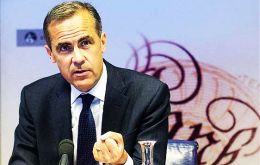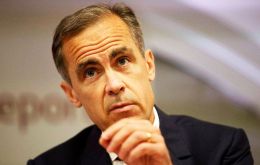MercoPress. South Atlantic News Agency
Tag: Bank of England
-
Friday, March 17th 2017 - 07:15 UTC
Bank of England cautiously leaves interest rates at the record low of 0.25%

The Bank of England (BOE) held interest rates at the record low level of 0.25% and maintained asset purchases at £435 billion on Thursday. The decision, which was made by an 8-1 majority, had been almost unanimously anticipated by central bank watchers with many expecting the BOE to choose caution until more clarity emerges on the Brexit process and the U.K. economy's capacity to manage outside of the European Union.
-
Friday, February 3rd 2017 - 11:23 UTC
Bank of England forecasts strong economic growth in next three years

The Bank of England revised up its economic growth forecasts for the British economy for the coming three years, crediting much of the improvement to the government’s decision to ease up on austerity in the wake of the country’s vote to leave the European Union.
-
Friday, December 16th 2016 - 10:44 UTC
Bank of England leaves rates unchanged: global outlook has become more fragile

The Bank of England voted unanimously on Thursday to keep the UK's main interest rate at a record low of 0.25%, and anticipated that the next rate move could be in either direction. The last change was a rate cut in August, in the wake of the UK's vote to leave the EU.
-
Saturday, November 5th 2016 - 09:49 UTC
Bank of England raises inflation and growth forecasts, but Brexit uncertainty remains

The Bank of England has raised its near-term growth and inflation forecasts on Thursday following the slide in sterling seen since the U.K.'s decision to leave the European Union. The bank decided Thursday to keep interest rates at the record low level of 0.25% and maintan its quantitative easing (QE) purchase targets at up to £10 billion for corporate bonds and £435 billion for U.K. government bonds.
-
Tuesday, November 1st 2016 - 02:05 UTC
Bank of England governor will step down in June 2019, after Brexit is over

Bank of England governor Mark Carney says he will step down in June 2019. It means he will serve one additional year beyond the five-year term he committed to when he took the post, but will still be two years short of the usual eight years governors serve.
-
Friday, September 16th 2016 - 07:06 UTC
Bank of England rates remain at record low, but could be further cut

The Bank of England said on Thursday it was still likely to cut interest rates to just above zero later this year, even though the initial Brexit hit to Britain's economy would be less severe than it expected only last month. The Bank said its nine rate-setters were unanimous in their decision to keep Bank Rate at its new record low of 0.25%, the lowest in the BoE's 322-year history.
-
Monday, September 5th 2016 - 11:50 UTC
Senior advisors propose a post-Brexit Britain “continental partnership” with EU

A senior German lawmaker, an adviser to the French prime minister and a former deputy head of the Bank of England have proposed that a post-Brexit Britain form a new “continental partnership” with the EU.
-
Friday, August 5th 2016 - 12:07 UTC
UK admits economy contraction and announces a bold package of stimulus measures

The Bank of England has unveiled a series of stimulus measures in the wake of Brexit, including its first interest rate cut since the global financial crisis (2009), as it tries to jumpstart an economy shocked by Britain’s vote to leave the European Union.
-
Thursday, June 16th 2016 - 23:36 UTC
“Increasingly likely” Sterling would drop further in the event of a Leave vote, warns Bank of England

The Bank of England has warned that uncertainty about the EU referendum is the “largest immediate risk” facing global financial markets. The bank said there were “risks of adverse spillovers to the global economy” from the 23 June vote and it was “increasingly likely” that sterling would fall further - perhaps sharply - in the event of a leave vote, the Bank added.
-
Friday, May 13th 2016 - 11:43 UTC
Bank of England warns about Brexit dangers, and triggers major controversy

The Bank of England has given its starkest warning yet that a UK vote to leave the EU could hit the economy. Mark Carney, the Bank's governor, warned that the risks of leaving “could possibly include a technical recession”.
